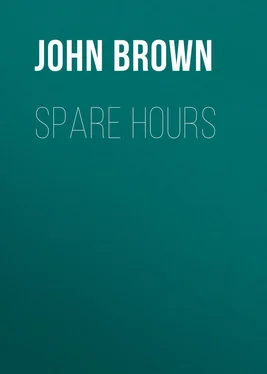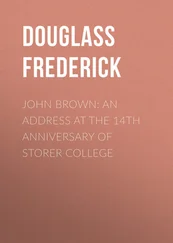John Brown - Spare Hours
Здесь есть возможность читать онлайн «John Brown - Spare Hours» — ознакомительный отрывок электронной книги совершенно бесплатно, а после прочтения отрывка купить полную версию. В некоторых случаях можно слушать аудио, скачать через торрент в формате fb2 и присутствует краткое содержание. ISBN: , Жанр: foreign_antique, foreign_prose, на английском языке. Описание произведения, (предисловие) а так же отзывы посетителей доступны на портале библиотеки ЛибКат.
- Название:Spare Hours
- Автор:
- Жанр:
- Год:неизвестен
- ISBN:http://www.gutenberg.org/ebooks/27153
- Рейтинг книги:4 / 5. Голосов: 1
-
Избранное:Добавить в избранное
- Отзывы:
-
Ваша оценка:
- 80
- 1
- 2
- 3
- 4
- 5
Spare Hours: краткое содержание, описание и аннотация
Предлагаем к чтению аннотацию, описание, краткое содержание или предисловие (зависит от того, что написал сам автор книги «Spare Hours»). Если вы не нашли необходимую информацию о книге — напишите в комментариях, мы постараемся отыскать её.
Spare Hours — читать онлайн ознакомительный отрывок
Ниже представлен текст книги, разбитый по страницам. Система сохранения места последней прочитанной страницы, позволяет с удобством читать онлайн бесплатно книгу «Spare Hours», без необходимости каждый раз заново искать на чём Вы остановились. Поставьте закладку, и сможете в любой момент перейти на страницу, на которой закончили чтение.
Интервал:
Закладка:
Descartes’ little tract on Method is, like everything the lively and deep-souled Breton did, full of original and bright thought.
Sir John Herschel’s volume needs no praise. We know no work of the sort, fuller of the best moral worth, as well as the highest philosophy. We fear it is more talked of than read.
We would recommend the article in the Quarterly Review as first-rate, and written with great eloquence and grace.
Sydney Smith’s Sketches of Lectures on Moral Philosophy . Second Edition.
Sedgwick’s Discourse on the Studies at Cambridge, with a Preface and Appendix . Sixth Edition.
We have put these two worthies here, not because we had forgotten them, – much less because we think less of them than the others, especially Sydney. But because we bring them in at the end of our small entertainment, as we hand round a liqueur – be it Curaçoa, Kimmel, or old Glenlivet – after dinner, and end with the heterogeneous plum-pudding – that most English of realized ideas. Sydney Smith’s book is one of rare excellence, and well worthy of the study of men and women, though perhaps not transcendental enough for our modern philosophers, male and female. It is really astonishing how much of the best of everything, from patriotism to nonsense, is to be found in this volume of sketches. You may read it through, if your sides can bear such an accumulation of laughter, with great benefit; and if you open it anywhere, you can’t read three sentences without coming across some, it may be common thought, and often original enough, better expressed and put than you ever before saw it. The lectures on the Affections, the Passions and Desires, and on Study, we would have everybody to read and enjoy.
Sedgwick is a different, and, as a whole, an inferior man; but a man every inch of him, and an Englishman too, in his thoughts, and in his fine mother wit and tongue. He has, in the midst of all his confusion and passionateness, the true instinct of philosophy – the true venatic sense of objective truth. We know nothing better in the main, than his demolition of what is untrue, and his reduction of what is absurd, and his taking the wind out of what is tympanitic, in the notorious Vestiges ; we don’t say he always does justice to what is really good in it; his mission is to execute justice upon it , and that he does. His remarks on Oken and Owen, and his quotations from Dr. Clarke’s admirable paper on the Development of the Fœtus , in the Cambridge Philosophical Transactions , we would recommend to our medical friends. The very confusion of Sedgwick is the free outcome of a deep and racy nature; it puts us in mind of what happened, when an Englishman was looking with astonishment and disgust at a Scotchman eating a singed sheep’s head, and was asked by the eater what he thought of that dish? “ Dish , sir, do you call that a dish?” “Dish or no dish,” rejoined the Caledonian, “there’s a deal o’ fine confused feedin’ aboot it, let me tell you.”
We conclude these rambling remarks with a quotation from Arnauld, the friend of Pascal, and the intrepid antagonist of the Vatican and the Grand Monarque; one of the noblest, freest, most untiring and honest intellects, our world has ever seen. “Why don’t you rest sometimes?” said his friend Nicole to him. “Rest! why should I rest here? haven’t I an eternity to rest in?” The following sentence from his “ Port-Royal Logic ,” so well introduced and translated by Mr. Baynes, contains the gist of all we have been trying to say. It should be engraven on the tablets of every young student’s heart – for the heart has to do with study as well as the head.
“There is nothing more desirable than good sense and justness of mind , – all other qualities of mind are of limited use, but exactness of judgment is of general utility in every part and in all employments of life.
“ We are too apt to employ reason merely as an instrument for acquiring the sciences, whereas we ought to avail ourselves of the sciences, as an instrument for perfecting our reason ; justness of mind being infinitely more important than all the speculative knowledge which we can obtain by means of sciences the most solid. This ought to lead wise men to make their sciences the exercise and not the occupation of their mental powers . Men are not born to employ all their time in measuring lines, in considering the various movements of matter: their minds are too great, and their life too short, their time too precious, to be so engrossed; but they are born to be just, equitable, and prudent, in all their thoughts, their actions, their business; to these things they ought especially to train and discipline themselves.”
So, young friends, bring Brains to your work, and mix everything with them, and them with everything. Arma virumque , tools and a man to use them. Stir up, direct, and give free scope to Sir Joshua’s “ that ,” and try again, and again; and look, oculo intento, acie acerrimâ . Looking is a voluntary act, – it is the man within coming to the window; seeing is a state, – passive and receptive, and, at the best, little more than registrative.
Since writing the above, we have read with great satisfaction Dr. Forbes’ Lecture delivered before the Chichester Literary Society and Mechanics’ Institute, and published at their request. Its subject is, Happiness in its relation to Work and Knowledge. It is worthy of its author, and is, we think, more largely and finely imbued with his personal character, than any one other of his works that we have met with. We could not wish a fitter present for a young man starting on the game of life. It is a wise, cheerful manly, and warm-hearted discourse on the words of Bacon, – “He that is wise, let him pursue some desire or other: for he that doth not affect some one thing in chief, unto him all things are distasteful and tedious.” We will not spoil this little volume by giving any account of it. Let our readers get it, and read it. The extracts from his Thesis, De Mentis Exercitatione et Felicitate exinde derivandâ , are very curious – showing the native vigor and bent of his mind, and indicating also, at once the identity and the growth of his thoughts during the lapse of thirty-three years.
We give the last paragraph, the sense and the filial affection of which are alike admirable. Having mentioned to his hearers that they saw in himself a living illustration of the truth of his position, that happiness is a necessary result of knowledge and work, he thus concludes: —
“If you would further desire to know to what besides I am chiefly indebted for so enviable a lot, I would say: – 1st, Because I had the good fortune to come into the world with a healthful frame, and with a sanguine temperament. 2d, Because I had no patrimony, and was therefore obliged to trust to my own exertions for a livelihood. 3d, Because I was born in a land where instruction is greatly prized and readily accessible. 4th, Because I was brought up to a profession which not only compelled mental exercise, but supplied for its use materials of the most delightful and varied kind. And lastly and principally, because the good man to whom I owe my existence, had the foresight to know what would be best for his children. He had the wisdom, and the courage, and the exceeding love, to bestow all that could be spared of his worldly means, to purchase for his sons, that which is beyond price , EDUCATION; well judging that the means so expended, if hoarded for future use, would be, if not valueless, certainly evanescent, while the precious treasure for which they were exchanged, a cultivated and instructed mind, would not only last through life, but might be the fruitful source of treasures far more precious than itself. So equipped he sent them forth into the world to fight Life’s battle, leaving the issue in the hand of God; confident, however, that though they might fail to achieve renown or to conquer Fortune, they possessed that which, if rightly used, could win for them the yet higher prize of HAPPINESS.”
Читать дальшеИнтервал:
Закладка:
Похожие книги на «Spare Hours»
Представляем Вашему вниманию похожие книги на «Spare Hours» списком для выбора. Мы отобрали схожую по названию и смыслу литературу в надежде предоставить читателям больше вариантов отыскать новые, интересные, ещё непрочитанные произведения.
Обсуждение, отзывы о книге «Spare Hours» и просто собственные мнения читателей. Оставьте ваши комментарии, напишите, что Вы думаете о произведении, его смысле или главных героях. Укажите что конкретно понравилось, а что нет, и почему Вы так считаете.












